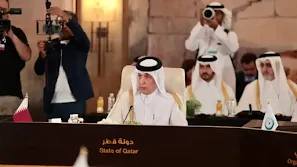Factors that hindered Qatari mediation in stopping the Gaza war and led to the suspension of negotiations
Qatari Minister of State for Foreign Affairs Sultan bin Saad Al-Muraikhi to visit Jordan to end war in Gaza
Article DescriptionAuthor, Jeremy HallAppointment, BBC
The Qatari government says it is suspending efforts to broker a peace deal between Israel and Hamas because both sides are not willing to negotiate.
The statement comes at a time when pressure is reportedly mounting from the United States on Qatar to close Hamas's office.
The small and wealthy state has chosen the role of mediator to bring peace to the Middle East. But in the current conflict between Israel and Hamas, it is becoming difficult for the state to mediate a ceasefire.
How did Qatar become a mediator for peace in the Middle East?
Qatar is a small country in the Persian Gulf with a total area of 11,600 square kilometers, but it exports large amounts of natural gas and ranks sixth in the world in terms of per capita income.
The Qatari government has chosen for itself the role of international peacemaker and has brokered several ceasefires and peace agreements between warring parties in the Middle East, Europe, and Africa over the past two decades.
Qatar hosted talks between Israel and Hamas in November 2023 for a temporary ceasefire, during which 105 Israeli hostages were released in exchange for 240 Palestinian prisoners.
Earlier in 2020, Qatar brokered a peace deal between the Taliban and the United States to end the two-decade war in Afghanistan.
The peace deal resulted in the withdrawal of US and allied forces from Afghanistan and the Taliban taking power.
In 2023, Qatar also brokered a prisoner exchange agreement between the United States and Iran.
That same year, the state also brokered talks between Russia and Ukraine to allow the return of Ukrainian children who had been taken from Ukraine to Russia during the two countries' ongoing conflict.
In 2020, Qatar brokered a ceasefire between the government of Chad and forty opposition groups.
And in 2010, the state oversaw a peace agreement between the government of Sudan and armed groups in the western province of Darfur.
Why did Qatar choose the role of a mediator?
The government of Qatar has written its role into the country’s constitution as a “peacemaker.”
According to Article 7 of the state’s constitution: “The foreign policy of the State shall be based on strengthening international peace and security through the peaceful resolution of international disputes.”
Qatar is a close ally of the United States, hosting thousands of its troops at Al-Udeid Air Base, and has also allowed groups such as the Taliban and Hamas to set up offices in its country.
Dr. H.A. Hellyer is affiliated with the Royal United Services Institute, a UK-based think tank.
He says this enables him to act as a bridge between two political parties that are unwilling to talk directly to each other.
He says, “Qatar can easily talk to groups like the Taliban and Hamas because they have never had any conflict with this state and because of the American military presence here, representatives of these groups feel safe in Doha.”
According to Dr. H.A. Hellyer, he feels that no one will attempt an assassination attempt on them here and in this safe environment, they can talk peacefully.
In 2020, Qatar brokered a peace deal between the Taliban and the United States to end the two-decade war in Afghanistan.
“Mediating for peace makes Qatar useful to the United States, and that means it can also be useful to Western countries,” says Dr. Sanam Wakil, a lawyer at the UK-based think tank Chatham House.
“And that’s why it also makes the areas around Qatar safe and stable,” she says.
Dr. Sanam Wakil says Qatar has its own team of diplomats, who are well-trained to oversee peace talks. However, she says this team is not always able to convince the opposing sides to sign a peace deal or a ceasefire.
She says the Qataris have a very good record of overseeing the end of conflicts during periods when both sides want peace after the violence has stopped. "But if that doesn't happen, they can't end the conflicts."
Why is Qatar finding it difficult to broker a peace deal between Israel and Hamas?
The Qatari Foreign Ministry has said it is suspending efforts to mediate a peace deal between Israel and Hamas.
However, it has denied reports that Hamas has closed its office in Doha.
Since then, the Israeli government has criticized Qatar, accusing the state of supporting Hamas and saying that it is nurturing a terrorist group.
Dr. Hellyer says that “when relations between Hamas and the Syrian government deteriorated in 2012, Qatar invited Hamas leaders to move their office from Damascus to Doha. They may have made this invitation on the advice of the United States and perhaps Israel was involved.”
He says that Qatar helped Israel and Hamas agree to a ceasefire after previous conflicts. However, he says that both sides wanted it at the time.
Dr. Sanam Vakil says that this time the situation is different. “The Israeli government wants its security guaranteed more than peace, and if the war continues, it will help it achieve its goals. On the other hand, Hamas needs peace to survive.”
There is also speculation that Hamas may move its office from Qatar to Turkey or Iran.
However, Dr. Hellyer says that Qatar is the safest place for Hamas leaders if they want to live there.
“When Ismail Haniyeh left Doha for Iran, he was immediately targeted by Israeli forces,” he says.
Related Topics:
#Hamas #Qatar #Taliban #Russia #Israel #Sudan #US











No comments: